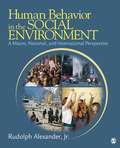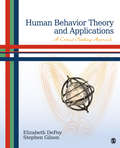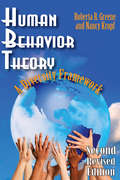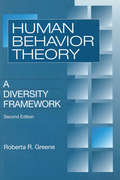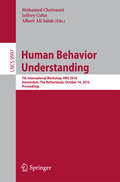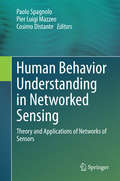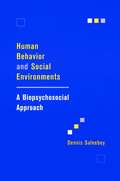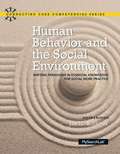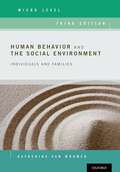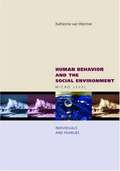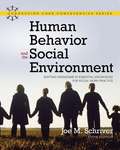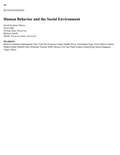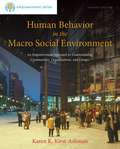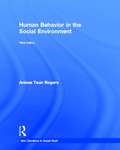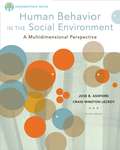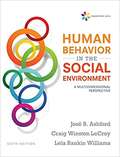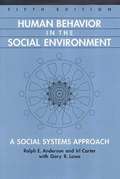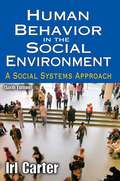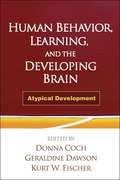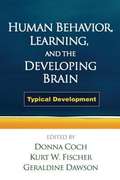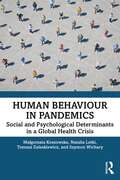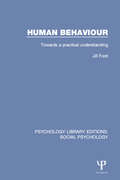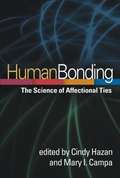- Table View
- List View
Human Barrier Design and Lifecycle: A Cognitive Ergonomics Approach and Path Forward
by Tom ShephardA common source of failure in a human‑dependent barrier or safety critical task is a designed‑in mismatch error. The mismatch is a cognitive demand that exceeds the human capability to reliably and promptly respond to that demand given the plausible situations at that moment. Demand situations often include incomplete information, increased time pressures, and challenging environments. This book presents innovative solutions to reveal, prevent, and mitigate these and many other cognitive‑type errors in barriers and safety critical tasks. The comprehensive model and methodologies also provide insight into where and to what extent these barriers and task types may be significantly underspecified and the potential consequences.This title presents a new and comprehensive prototype design and lifecycle model specific to human‑dependent barriers and safety critical tasks. Designed to supplement current practice, the model is fully underpinned by cognitive ergonomics and cognitive science. The book also presents a compelling case for why a new global consensus standard specific to human‑dependent barriers is needed. Taking a novel approach, it presents its suggested basis, framing, and content. Both solutions seek to redress deficiencies in global regulations, standards, and practice. The model is guided by industry recommendations and best practice guidance and solutions from globally recognized experts. Its processes are fully explained and supported by examples, analysis, and well‑researched background materials. Real‑life case studies from offshore oil and gas, chemical manufacturing, transmission pipelines, and product storage provide further insight into how overt and latent design errors contributed to barrier degradation and failure and the consequence of those errors.An essential and fascinating read for professionals, Human Barrier Design and Lifecycle: A Cognitive Ergonomics Approach and Path Forward will appeal to those in the fields of human factors, process and technical safety, functional safety, display and safety system design, risk management, facility engineering, and facility operations and maintenance.Chapters 1 and 8 of this book are freely available as downloadable Open Access PDFs at http://www.taylorfrancis.com under a Creative Commons Attribution-Non Commercial-No Derivatives (CC-BYNC-ND) 4.0 International license.
Human Behavior In The Social Environment: A Macro, National, And International Perspective
by Rudolph AlexanderHuman Behavior and the Social Environment: A Macro, National, and International Perspective is a textbook for one of the primary courses in the social work curriculum titled Human Behavior in the Social Environment. The course is offered usually over two semesters, with one focusing on micro issues (how the individual develops in relation to their social enviroment on an individual, family, and group level). The second section of the course typically focuses on macro issues pertaining to how an individual is shaped by their social environment by macro issues including social institutions, community, and the government. This book is intended for the second sequence of the course. It takes a unique approach by incorporating international issues of globalization, which has been an emerging issue in social work. Although it takes this unique perspective, it still covers the basics of macro social work on a national level. Other important areas that are not well represented in competing texts includes coverage of rural issues, the impact of hurricane Katrina on social and community resources, human rights and social justice, the increasing impact of increasing rates of incarceration, and a special section focusing on crisis theory. This book has a number of key selling points. They include: A broad national and international perspective A timely approach that examines issues such as rural communities, the impact of disaster on communities, and increasing incarceration rates Provides special emphasis on human needs and social justice End of chapter discussion questions A student glossary Chapter opening photos An appendix that includes three additonal higher level macro theories which would make the book applicable to Master's level program This book will also contain a number of features that are essential for any book to be adopted in a HBSE course. They include: End of chapter discussion questions Instructor's manual featuring powerpoint slides and a test bank Student study site for recommended reading, chapter summaries, and flash cards
Human Behavior Theory and Applications: A Critical Thinking Approach
by Professor Elizabeth G. DePoy Stephen F. GilsonIn Human Behavior Theory and Applications, authors Elizabeth DePoy and Stephen Gilson use a critical thinking approach to engage students to think in depth about theory and its use in social work practice. With a strong focus on diversity, this book expands its theory coverage to include progressive and the most cutting-edge contemporary thinking. The authors skillfully introduce theory, critically examine each theory, including developmental theories, environmental theories, diversity theories, systems theories, and new and emerging theories, and then apply each theory to social work practice providing a synthesis of classical and contemporary theory for scholarly analysis and application to professional, intellectual, and social action.
Human Behavior Theory: A Diversity Framework (Modern Applications Of Social Work Ser.)
by Nancy KropfAs American society becomes increasingly diverse, social workers must use a variety of human behavior frameworks to understand their clients' culturally complex concerns. This text applies specific human behavior theories to diversity practice. They show how human behavior theory can be employed in interventions in the life problems of diverse client populations at the individual, group, social network, and societal levels.Several groups are examined. They include: minority groups; ethnic groups; women; older adults; members of certain social classes affected by economic and educational (dis)advantage, especially those living in poverty; people with developmental disabilities, people of varying sexual and gender orientations, and religious groups.Case studies that illustrate social work practice in the area are highlighted. The case studies include Social Work Practice within a Diversity Framework; The Social Work Interview; Symbolic Interactionism: Social Work Assessment, Meaning, and Language; Erikson's Eight Stages of Development; Role Theory and Social Work Practice; A Constructionist Approach; Risk, Resilience and Resettlement; Addressing Diverse Family Forms; Small Group Theory; Natural Social Networks; Power Factors in Social Work Practice. This volume will be a fundament resource for practitioners and an essential tool for training.
Human Behavior Theory: A Diversity Framework (Modern Applications Of Social Work Ser.)
by Roberta GreeneIn recent years, advocates for civil rights for minorities, women, and gays and lesbians have become more informed consumers of mental health services. As a result, social work practitioners need to prepare themselves to serve diverse constituencies for who previously held behavioral and cultural assumptions have proven not to be universally applicable. The purpose of Greene's book is to help students and practitioners better understand how social workers have used human behavior theories to more competently address variations in group and community membership within the social worker-client encounter.The book's approach is largely thematic. Most of the chapters explore how particular assumptions of a human behavior theory--psychoanalytic theory, psychodynamic/ego psychology theory, systems theory, behavioral theory, symbolic interaction theory, feminist theory, constructionist theory, small group theory, and an ecological perspective --have been used to answer issues related to cultural diversity. The challenges and limitations of each theory's applications across varying client constituencies are discussed throughout. What sorts of new conceptual issues for the practitioner of family services are raised in work with minority families, for example, or with lesbian families? How does a specific theory help, or not help, in group-specific interventions and evaluations?Intended as a companion volume to the widely adopted human behavior text by Greene and Ephross, Greene's new book fills the need for a wide, synthetic reading of the recent literature.
Human Behavior Understanding
by Albert Ali Salah Jeffrey Cohn Mohamed ChetouaniThis book constitutes the refereed proceedings of the 7th International Workshop on Human Behavior Understanding, HBU 2016, held in Amsterdam, The Netherlands, in October 2016. The 10 full papers were carefully reviewed and selected from 17 initial submissions. They are organized in topical sections named: behavior analysis during play; daily behaviors; gesture and movement analysis; and vision based applications.
Human Behavior Understanding in Networked Sensing
by Cosimo Distante Pier Luigi Mazzeo Paolo SpagnoloThis book provides a broad overview of both the technical challenges in sensor network development, and the real-world applications of distributed sensing. Important aspects of distributed computing in large-scale networked sensor systems are analyzed in the context of human behavior understanding, including topics on systems design tools and techniques. Additionally, the book examines a varied range of applications. Features: contains valuable contributions from an international selection of leading experts in the field; presents a high-level introduction to the aims and motivations underpinning distributed sensing; describes decision-making algorithms in the presence of complex sensor networks; provides a detailed analysis of the design, implementation, and development of a distributed network of homogeneous or heterogeneous sensors; reviews the application of distributed sensing to human behavior understanding and autonomous intelligent vehicles; includes a helpful glossary and a list of acronyms.
Human Behavior and Social Environments: A Biopsychosocial Approach (Foundations of Social Work Knowledge Series)
by Dennis SaleebeyHuman behavior is a subject so vast that it would seem to defy one's ability to comfortably and confidently grasp its varieties, nuances, shapes, and dynamics. But in this wide-ranging and comprehensive survey of the contexts of human behavior, Dennis Saleebey examines the different social science approaches to understanding the way humans react to and are affected by their environment.Using a biopsychosocial perspective, this book demonstrates that there are many paths of knowledge, many methods of inquiry, and many perspectives that can guide one's understanding of human behavior. Resilience (how we cope with trauma) and meaning-making (how we see and make sense of the world around us) provide the conceptual framework of the book. Saleebey examines a number of specific theories relevant to the biopsychosocial approach: part/whole analysis, psychodynamic theory, ecological theory, cognitive theory, and radical/critical theory. Human development is presented as a continuing interaction between individual, family, community, social institutions, and culture. Pedagogical devices to aid the student include chapter overviews, case studies, and meaning-making dialogues at the end of each chapter that pose questions for further thought.
Human Behavior and The Social Environment: Shifting Paradigms in Essential Knowledge for Social Work Practice
by Joe M. SchriverHuman Behavior and the Social Environment, 6/e challenges students to explore both traditional and non-traditional paradigms in examining human behavior and the social environment. Through this examination, readers will better understand individuals, families, groups, organizations, communities and globalization. Students will recognize the range of social systems in which people live and the ways these systems promote or deter people in their health and wellbeing.
Human Behavior and the Social Environment, Micro Level: Individuals and Families
by Katherine Van WormerHuman Behavior and the Social Environment, Micro Level draws on a resilience model to explore the dynamics of human behavior across the life span. Biological, psychological, and spiritual dimensions are covered. Illustrations and vignettes from social work, psychology, literature, philosophy, and current events highlight the turning points in our lives. Critical thinking questions are provided. The result is an essential book that bridges theory and practice in accordance with the 2015 Council on Social Work Education (CSWE) standards.
Human Behavior and the Social Environment: Micro Level: Individuals and Families
by Katherine Van WormerIn a fresh, elegant, and accessible manner, Human Behavior and the Social Environment, Micro Level explores the nuances of the biological, psychological, cultural, and spiritual dimensions of our social lives. Drawing on examples from social work, psychology, literature, philosophy, and current events, it richly illustrates human development and behavior, both normal and abnormal. <P><P>Katherine van Wormer skillfully integrates recent research ranging from brain imaging to international surveys on happiness, lending extraordinary insight into our drives and motivations. The result is a singular textbook that truly bridges theory and practice by revealing the patterns and paradoxes of our behavior in the social context.
Human Behavior and the Social Environment: Shifting Paradigms in Essential Knowledge for Social Work Practice (5th edition)
by Joe M. SchriverThis textbook offers a comparative examination of competing paradigms in the study of human behavior and the social environment. The text focuses at each system level on the need for multiple perspectives that respect the diversity of persons and environments with whom social workers interact.
Human Behavior and the Social Environment: Social Systems Theory
by Rebecca Smith Orren DaleHuman Behavior and the Social Environment: Social Systems Theory provides an expanded treatment of systems theory, and applies the theory to common social work concerns. The text links systems to social roles, and provides a framework for critical assessment of the theories from the systems/roles perspective. It assesses the strengths and weaknesses of each theory with regard to the value of each theory for social work practice. <P><P> Social systems theory remains the focus of this text. In addition theories are identified as grand theories, middle range theories, or focal theories, to assist the student in understanding the scope and application of theories across system sizes. This text breaks new ground in using role theory as a middle range theory to address common features of human systems at a level that is more intuitive for students, and yet detailed enough to stimulate independent thinking. The text addresses the standard repertoire of theories, and in addition presents application of the theories to social issues such as violence and addiction.
Human Behavior in the Macro Social Environment: An Empowerment Approach to Understanding Communities,Fourth Edition
by Karen K. Kirst-AshmanFocusing on empowerment and stressing critical thinking, this book explores human behavior in task groups, organizations, and communities. The intent is to provide a sound knowledge base for understanding how the macro social environment works and make it easier for students to apply theory in subsequent practice courses.
Human Behavior in the Social Environment
by Anissa Taun RogersThis bestseller is ideal for use in either one-semester or year-long generalist human behavior courses. Why? Because the text is concise and easily used in a one-semester course. But the text also comes with a companion set of readings and five unique cases that encourage your students to "learn by doing" and to apply their knowledge of human behavior to best practices. Go to www.routledgesw.com/hbse to learn more. These additional resources easily allow you to use the text (and its related resources) in a two-semester sequence.
Human Behavior in the Social Environment (Cengage Learning Empowerment Series)
by Craig Lecroy José AshfordThis lively, comprehensive introduction to human behavior in the social environment offers a multidimensional approach to the topic, with discussion of integrative practice, theory, treatment, and services as well as matters pertaining to diversity addressed throughout the text. The text provides solid coverage of foundation knowledge, integrates the biopsychosocial dimensions for assessing social functioning, and offers case studies to illuminate the applied aspects of the content. Furthermore, as part of the Brooks/Cole Empowerment Series, the fifth edition thoroughly integrates the core competencies and recommended practice behaviors outlined in the 2008 Educational Policy and Accreditation Standards (EPAS) set by the Council on Social Work Education (CSWE), thus helping you connect foundation knowledge with specific practice concerns. Study tables and concept maps (for each discussion of behavior in the development chapters) clarify major phases of biopsychosocial development across the life span. This framework gives you a concrete tool for assessing human behavior from a perspective that reflects the values and knowledge base of the social work profession.
Human Behavior in the Social Environment: A Multidimensional Perspective (Empowerment Series)
by Craig Winston LeCroy Lela Rankin Williams Jose B. AshfordThis lively, comprehensive introduction to human behavior in the social environment offers a multidimensional approach, with discussion of integrative practice, theory, treatment, and services as well as matters pertaining to diversity. You'll find solid coverage of foundation knowledge, material on the biopsychosocial dimensions for assessing social functioning, and case studies to illuminate the applied aspects of case formulation processes. <p><p>The sixth edition integrates the core competencies and recommended practice behaviors outlined in the 2015 Educational Policy and Accreditation Standards (EPAS) set by the Council on Social Work Education (CSWE), helping you connect foundation knowledge with practice concerns. Study tables and concept maps clarify major phases of biopsychosocial development. In short, this text's framework gives you a concrete tool for assessing human behavior from a perspective that reflects the values and knowledge base of the social work profession.
Human Behavior in the Social Environment: A Social Systems Approach (5th edition)
by Ralph E. Anderson Gary R. Lowe Irl CarterThis book is an attempt to map the territory of human behavior. It is intended to introduce students in the human services to ideas and theories that are fundamental to understanding human behavior. Students in social work, nursing, education, home economics, child development, and other disciplines that provide human services require an acquaintance with a vast body of knowledge about the behavior of humans. Today it is impossible to present enough information in one book to accomplish this.In our teaching and in our students' learning, we found that we came nearest to accomplishing this task by writing this book and using it as a global map of human behavior. It designates the major levels of knowledge of human behavior and enables students to recognize the human systems that most concern them. It is designed to organize human behavior content into an understandable whole.
Human Behavior in the Social Environment: A Social Systems Approach (Sixth Edition)
by Irl CarterSince the publication of the first edition of Human Behavior in the Social Environment, several generations of students have successfully used this classic text, which takes a social systems approach to human behavior. This systems approach is still widely accepted in the human services disciplines, including social work, education, nursing, psychology, and in human services programs themselves. Its ideas have become the organizing framework for curriculum, as well as fruitful sources for new applications of theory and practice. Among the advantages of the social systems approach is that it permits students and practitioners to see connections between fields of practice, between methods, and across professional disciplines and bodies of theory. The book serves as a template of the concentric circles of human behavior, with chapters on fields of behavior, beginning with the person and ranging outward to culture and society. Abundant examples from practice and from behavioral patterns are drawn from the social sciences, topical events, literature, and the authors’ personal and professional experiences. This volume responds to the needs of students and instructors as these have developed since the publication of the previous edition.
Human Behavior, Learning, and the Developing Brain
by Geraldine Dawson Donna CochThoroughly examining brain-behavior relationships in atypically developing children, this important volume integrates theories and data from multiple disciplines. Leading authorities present research on specific clinical problems, including autism, Williams syndrome, learning and language disabilities, ADHD, and issues facing infants of diabetic mothers. In addition, the effects of social stress and maltreatment on brain development and behavior are reviewed. Demonstrating the uses of cutting-edge methods from developmental neuroscience, developmental psychology, and cognitive science, the contributors emphasize the implications of their findings for real-world educational and clinical practices. Illustrations include eight pages in full color.
Human Behavior, Learning, and the Developing Brain
by Donna Coch Kurt FischerThis volume brings together leading authorities from multiple disciplines to examine the relationship between brain development and behavior in typically developing children. Presented are innovative cross-sectional and longitudinal studies that shed light on brain-behavior connections in infancy and toddlerhood through adolescence. Chapters explore the complex interplay of neurobiological and environmental influences in the development of memory, language, reading, inhibitory control, and other core aspects of cognitive, emotional, and social functioning. Throughout, the volume gives particular attention to what the research reveals about ways to support learning and healthy development in all children. Illustrations include four pages in full color.
Human Behaviour in Pandemics: Social and Psychological Determinants in a Global Health Crisis
by Malgorzata Kossowska Tomasz Zaleskiewicz Natalia Letki Szymon WicharyThis timely interdisciplinary book brings together a wide spectrum of theoretical concepts and their empirical applications in relation to the COVID-19 pandemic, informing our understanding of the social and psychological bases of a global crisis. Written by an author team of psychologists and sociologists, the volume provides comprehensive coverage of phenomena such as fear, risk, judgement and decision making, threat and uncertainty, group identity and cohesion, social and institutional trust, and communication in the context of an international health emergency.The topics have been grouped into four main chapters, focusing on the individual, group, social, and communication perspectives of the issues affecting or being affected by the pandemic, based on over 740 classic and current references of peer-reviewed research and contextualized with an epidemiological perspective discussed in the introduction. The volume finishes with two special sections, with a chapter on cultural specificity of the social impact of pandemics, focusing specifically on both Islam and Hinduism, and a chapter on the cross-national differences in policy responses to the current health crisis. Providing not just a reference for academic research, but also short-term and long-term policy solutions based on successful strategies to combat adverse social, cognitive, and emotional consequences, this is the ideal resource for academics and policymakers interested in social and psychological determinants of individual reactions to pandemics, as well as in fields such as economics, management, politics, and medical care.
Human Behaviour: Towards a practical understanding (Psychology Library Editions: Social Psychology #10)
by Jill FordOriginally published in 1983, this clear-sighted study built an understanding of what human behaviour meant at the time: an understanding which can still be of practical use for those who work with people in their everyday lives today. The various influences on the individual are carefully examined, with theoretical approaches from different standpoints considered in relation to one another, from the development of the personality and behaviour patterns to the effect of family and social life, culminating in the picture of a ‘whole’, responsive person. Relationships are seen to be important, and this is reflected in the selection of material. Ford argues that it is the social worker’s role to offer guidance relating to the nature and quality of an individual’s interaction with society, and that this can be done more effectively if there is a practical understanding of how this interaction evolves. Examples of social work practice are given throughout to show how such understandings may be used.
Human Beings in International Relations
by Jacobi, Daniel and Freyberg-Inan, Annette Daniel Jacobi Annette Freyberg-InanSince the 1980s, the discipline of International Relations has seen a series of disputes over its foundations. However, there has been one core concept that, although addressed in various guises, had never been explicitly and systematically engaged with in these debates: the human. This volume is the first to address comprehensively the topic of the human in world politics. It comprises cutting-edge accounts by leading scholars of how the human is (or is not) theorized across the entire range of IR theories, old and new. The authors provide a solid foundation for future debates about how, why, and to which ends the human has been or must (not) be built into our theories, and systematically lay out the implications of such moves for how we come to see world politics and humanity's role within it.
Human Bonding
by Cindy Hazan Mary I. CampaThis tightly edited volume provides an integrative overview of human bonding from infancy through adulthood. Through an attachment lens, the book synthesizes classic and cutting-edge research on close relationships and their profound impact in everyday life. Topics include infant-caregiver attachment, human social nature, child and adolescent social development, mate selection, love and sexual desire, hooking up and online dating, keys to relationship success, predictors and consequences of relationship dissolution, and the role of social connectedness in psychological adjustment and physical health. Readers get a solid grounding in the concepts, theories, and methods that define contemporary relationship science.

